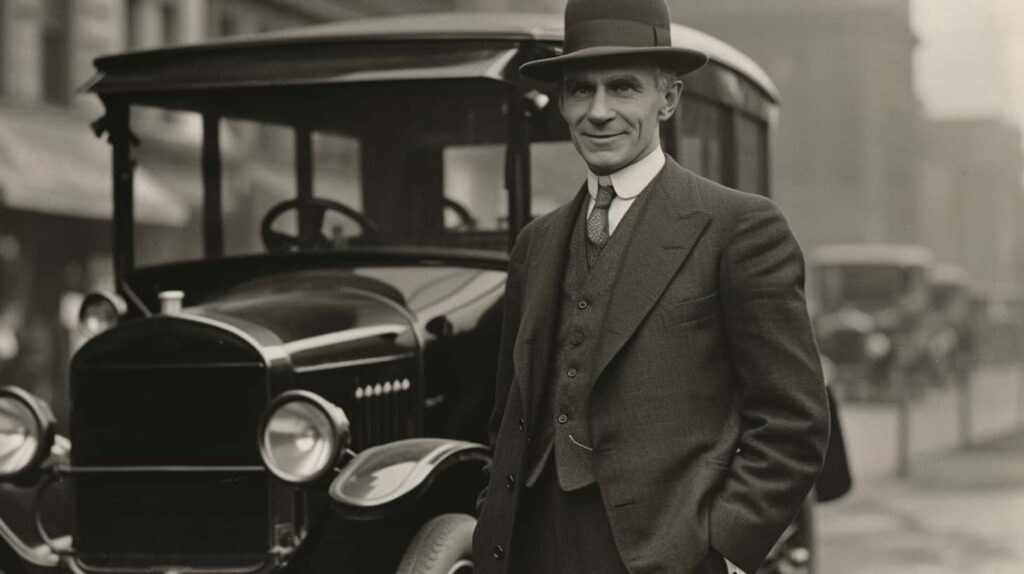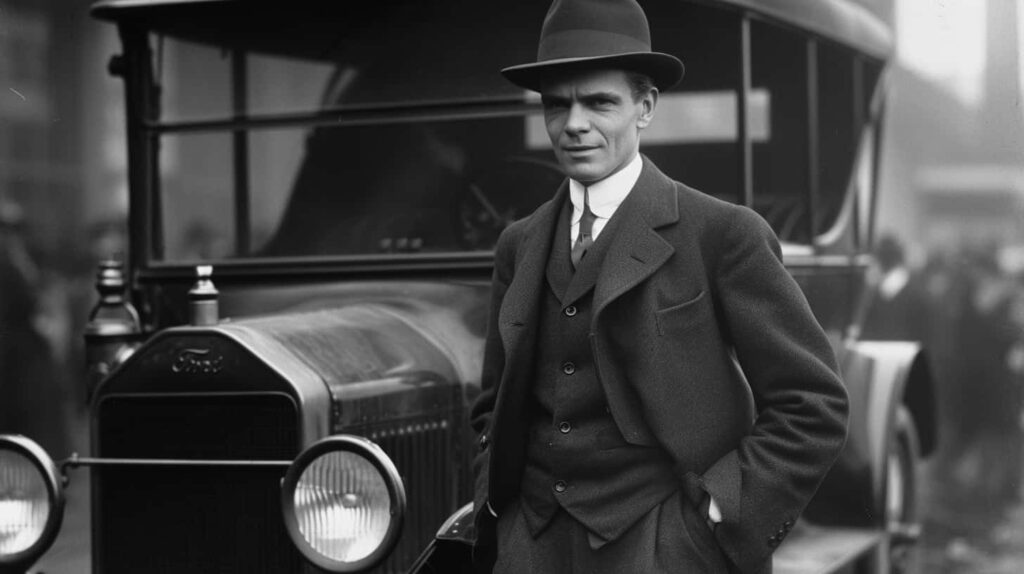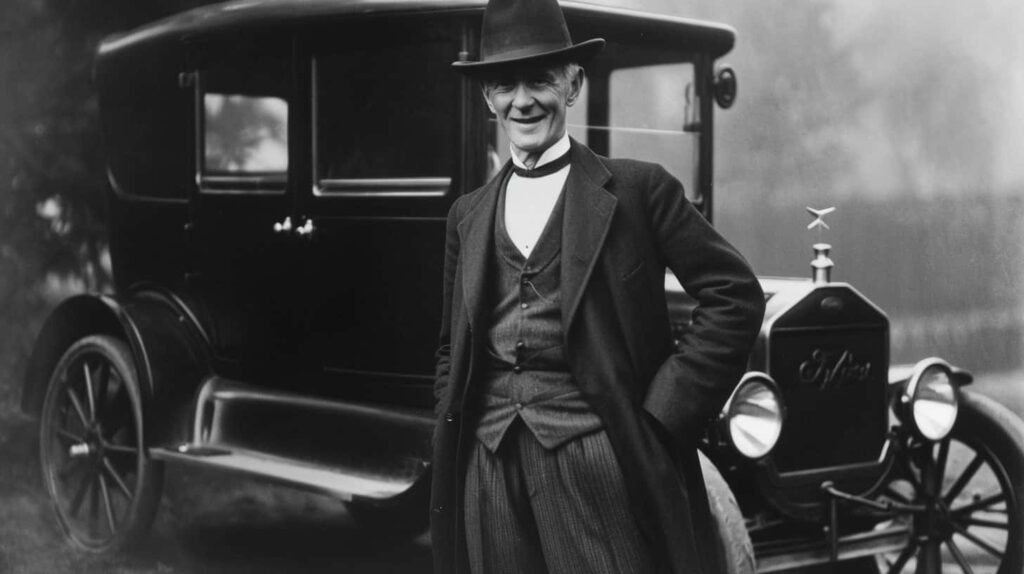Famous Personalities
Henry Ford Quotes – Famous Founder of Ford Motor Company

As authors, we frequently find our inspiration in the knowledge and perspectives of remarkable people who have influenced our planet. Henry Ford, the renowned creator of Ford Motor Company, is one such figure. With his pioneering ideas and unwavering determination, Ford transformed the car industry and made a lasting impact on the annals of history.
In his quotes, we can find valuable lessons on leadership, teamwork, hard work, and the importance of customer focus. Ford’s unwavering belief in the power of change and adaptation, coupled with his strong character, has made him a legendary figure in the business world.
Join us as we delve into the inspiring words of Henry Ford and discover the timeless wisdom that continues to resonate with us today.
Key Takeaways
- Perseverance and resilience are essential qualities for achieving success, as they allow individuals to overcome obstacles and bounce back from setbacks.
- Innovation and ingenuity are crucial for finding unique solutions to complex challenges, and thinking outside the box can lead to revolutionary inventions.
- Ford’s revolutionary inventions, such as the Model T and the assembly line, revolutionized transportation and industrial efficiency, setting new standards for performance and productivity.
- Ford’s forward-thinking strategies, which involved anticipating future needs and continuously improving products, helped him stay ahead of the competition and drive success.
The Power of Perseverance
Perseverance is the unwavering determination to overcome obstacles and achieve success, and it’s a powerful force that drives individuals to reach their goals. The importance of resilience in overcoming obstacles can’t be overstated. It’s through perseverance that we’re able to navigate the challenges that life throws our way and continue moving forward towards our desired outcomes.
Resilience is the ability to bounce back from setbacks, to adapt and grow in the face of adversity. It’s what allows us to persevere when things get tough and to keep pushing forward despite the obstacles in our path. Without resilience, our dreams and aspirations can easily be derailed by the inevitable setbacks and failures that we encounter along the way.
Overcoming obstacles is a fundamental part of the journey towards success. It’s through facing and conquering these challenges that we develop the strength and skills necessary to achieve our goals. Each obstacle we overcome strengthens our resolve and builds our resilience, making us better equipped to face future challenges.

Perseverance isn’t just about pushing through difficulties; it’s also about learning from them and using them as opportunities for growth. It’s about having the mindset that setbacks aren’t permanent roadblocks, but rather stepping stones towards success.
Innovation and Ingenuity
When it comes to innovation and ingenuity, Henry Ford was a true visionary. His creative problem-solving skills allowed him to revolutionize the automobile industry with inventions such as the assembly line.
Ford’s forward-thinking strategies not only transformed the way cars were manufactured, but also had a profound impact on the entire industrial landscape. His ability to think outside the box and push the boundaries of what was possible is a testament to his remarkable ingenuity.
Creative Problem-Solving
Innovation and ingenuity are crucial for creative problem-solving, enabling us to find unique and effective solutions to complex challenges. When faced with a problem, it’s important to approach it with a mindset that embraces new ideas and unconventional thinking.
By thinking outside the box, we can come up with innovative problem-solving strategies that others may overlook. Creative solutions often require us to break free from traditional methods and explore new possibilities. This requires a willingness to take risks and a belief in our ability to find unconventional answers.
Henry Ford, the famous founder of Ford Motor Company, understood the importance of creative problem-solving. He once said, ‘If I’d asked people what they wanted, they’d have said faster horses.’ Ford’s innovative thinking revolutionized the automobile industry and showcases the power of creative problem-solving.

Revolutionary Inventions
The revolutionary inventions of Henry Ford demonstrate the power of innovation and ingenuity in transforming industries and shaping the world we live in today. Ford’s transformative breakthroughs revolutionized the manufacturing process and transportation industry, leaving an indelible mark on history. Here are five of his most significant inventions:
- The Model T: Ford’s introduction of the affordable and mass-produced Model T made cars accessible to the average person, revolutionizing transportation and paving the way for the modern automotive industry.
- The Assembly Line: Ford’s implementation of the assembly line drastically reduced production time and costs, allowing for the mass production of automobiles and setting a new standard for manufacturing efficiency.
- The Fordson Tractor: This affordable and durable tractor brought mechanization to agriculture, increasing productivity and transforming farming practices.
- The V8 Engine: Ford’s development of the V8 engine provided more power and efficiency, setting a new standard for automobile performance.
- The River Rouge Complex: Ford’s vertically integrated manufacturing complex revolutionized industrial efficiency by consolidating all stages of production in one location.
These revolutionary inventions not only transformed industries but also had a profound impact on society, shaping the way we live, work, and travel. Henry Ford’s innovative spirit continues to inspire generations of inventors and entrepreneurs to push the boundaries of what’s possible.
Forward-Thinking Strategies
Ford’s revolutionary inventions not only transformed industries and shaped the world, but they also laid the foundation for forward-thinking strategies based on innovation and ingenuity.
Ford’s approach to problem-solving was characterized by his ability to think ahead and anticipate future needs. He understood that innovation wasn’t just about creating something new, but also about finding creative solutions to existing problems. This forward-thinking mentality allowed him to continuously improve and refine his inventions, leading to the development of more efficient and affordable products.
Ford’s commitment to innovative problem-solving is evident in his famous quote, ‘If I’d asked people what they wanted, they’d have said faster horses.’ This mindset of challenging conventional wisdom and pushing boundaries has become a hallmark of successful companies today, who recognize the importance of forward-thinking strategies in staying ahead of the competition.
On Leadership and Teamwork
Effective leadership and strong teamwork were key principles emphasized by Henry Ford. As a visionary leader, Ford possessed a unique set of leadership qualities that allowed him to propel his team and company forward. Here are five important aspects of leadership and team dynamics that Ford highlighted:
- Clear Vision: Ford believed that a leader should have a clear vision of the future and effectively communicate it to the team. This clarity of purpose helps align everyone towards a common goal.
- Empowerment: Ford believed in empowering his employees and giving them the autonomy to make decisions. He understood that by trusting his team, they’d become more invested in their work and strive for excellence.
- Collaboration: Ford emphasized the importance of collaboration and teamwork. He encouraged open communication and valued the input of every team member, fostering an environment where ideas could be shared freely.
- Continuous Improvement: Ford believed in continuously improving processes and products. He encouraged his team to experiment, learn from failures, and innovate, driving the company’s success.
- Positive Culture: Ford recognized the significance of fostering a positive work culture. He believed in treating employees with respect and promoting a sense of camaraderie, creating a supportive and productive environment.
The Importance of Hard Work
Hard work is pivotal in achieving success, as Henry Ford’s principles and actions exemplify. Ford believed that success is directly proportional to the amount of effort one puts in. He famously said, ‘The harder you work, the luckier you get.’ This quote encapsulates his belief in the rewards of perseverance and the role of dedication and commitment.
Ford’s own life is a testament to the importance of hard work. From a young age, he displayed a strong work ethic and a relentless drive to succeed. He worked tirelessly to build the Ford Motor Company, starting from scratch and overcoming numerous obstacles along the way. His commitment to his vision and his relentless pursuit of excellence propelled him to great heights.
Ford recognized that success doesn’t come easy. It requires unwavering dedication, discipline, and a willingness to put in the necessary effort. He believed that hard work was the key to unlocking one’s full potential and achieving one’s goals.

In today’s competitive world, the importance of hard work can’t be overstated. It’s the foundation upon which success is built. Those who are willing to put in the time, effort, and energy required to achieve their goals are the ones who’ll ultimately succeed. Ford’s example serves as an inspiration to all, reminding us of the power of hard work and the immense rewards it brings.
Thinking Outside the Box
When it comes to problem-solving, thinking outside the box is essential.
Henry Ford was a firm believer in innovative thinking and creative solutions. He understood that unconventional approaches often lead to breakthroughs and success.
Innovative Problem-Solving
To effectively tackle complex problems, it’s crucial to think outside the box and approach them with innovative solutions. Creative problem solving techniques can help us find unique and effective ways to address challenges. Here are five problem-solving strategies that can encourage innovative thinking:
- Brainstorming: Generating a wide range of ideas without judgment or criticism.
- Mind mapping: Creating visual diagrams to explore connections and relationships between different ideas.
- Reverse thinking: Approaching a problem from a different perspective, considering the opposite or inverse.
- Analogies: Drawing parallels between unrelated concepts to inspire fresh insights.
- Prototyping: Building and testing small-scale models or prototypes to explore potential solutions.
Creative Solutions
In order to find innovative solutions, it is crucial to think outside the box and approach problems with creative thinking techniques. Creative problem solving involves breaking free from traditional thought patterns and exploring unconventional ideas. By thinking outside the box, we can challenge assumptions, identify alternative perspectives, and discover new approaches to problem-solving.
One effective technique for thinking outside the box is brainstorming. This involves generating a large number of ideas without judging or dismissing them initially. Another technique is lateral thinking, which involves approaching problems from unexpected angles and making unusual connections. Additionally, using analogies and metaphors can help stimulate creative thinking by drawing parallels between unrelated concepts.
To further engage the audience, here is a table showcasing different creative thinking techniques:
Technique Description Brainstorming Generating a multitude of ideas without judgment or evaluation. Lateral Thinking Approaching problems from unconventional angles and making unexpected connections. Analogies Drawing parallels between unrelated concepts to inspire new insights. Metaphors Using symbolic comparisons to facilitate understanding and generate fresh perspectives. Mind Mapping Visualizing ideas and their relationships to spark creative thinking and organize thoughts effectively.
Unconventional Thinking
After exploring creative problem-solving techniques such as brainstorming and lateral thinking, we now shift our focus to the importance of unconventional thinking in finding innovative solutions. Unconventional thinking allows us to break free from traditional approaches and explore unorthodox strategies that can lead to disruptive thinking.
Here are five benefits of unconventional thinking:
- Sparks Creativity: By challenging the status quo, unconventional thinking opens up new possibilities and stimulates creative ideas.
- Encourages Risk-taking: Unconventional thinking empowers individuals to take risks and embrace failure as a learning opportunity.
- Promotes Innovation: By thinking outside the box, unconventional thinkers can identify unique solutions that revolutionize industries.
- Enhances Problem-solving: Unconventional thinking helps to identify alternative perspectives and find unconventional solutions to complex problems.
- Drives Competitive Advantage: Embracing unconventional thinking gives businesses a competitive edge by offering fresh ideas and approaches.
The Value of Time
Time is a precious resource that we must value and utilize wisely, as Henry Ford once said, ‘Time wasted is existence; used, it’s life.’ The value of time can’t be overstated. It’s a finite resource that can’t be replenished, and once it’s gone, it’s gone forever. Understanding the importance of prioritization is crucial in making the most of our time.
Prioritization involves identifying the tasks and activities that align with our goals and have the greatest impact. It requires careful consideration and decision-making to allocate our time effectively. By prioritizing, we can focus on the tasks that will bring us closer to our objectives and eliminate or delegate those that are less important.
When we prioritize, we’re able to manage our time more efficiently. We become more productive and accomplish more in less time. This allows us to create a better work-life balance and have more time for the things that truly matter to us.
Henry Ford’s quote reminds us that time isn’t just about existence; it’s about truly living. It’s about using our time wisely and purposefully to create a meaningful and fulfilling life. So let’s value our time, prioritize our tasks, and make the most of every moment.
Success Through Failure
Failure can be a stepping stone to success, as Henry Ford famously believed. In the world of entrepreneurship, success stories often emerge from the ashes of failure. Learning from mistakes and using them as opportunities for growth is a key component of achieving success. Here are five reasons why failure can lead to success:
- Learning experience: Failure provides valuable lessons that can inform future decisions and actions.
- Motivation: Failing can fuel a person’s determination to succeed and push them to work harder towards their goals.
- Resilience: Overcoming failure builds resilience and the ability to bounce back from setbacks.
- Innovation: Failure forces individuals to think creatively and find new approaches to achieve their desired outcome.
- Self-awareness: Failing allows individuals to identify their strengths and weaknesses, enabling them to make necessary improvements.
The Impact of Technology
As we delve into the impact of technology, we can’t ignore the significant advancements it has brought to various industries.
Henry Ford, known for his innovative manufacturing techniques, revolutionized the automobile industry through his introduction of the assembly line. This not only increased efficiency and productivity but also made cars more affordable and accessible to the masses.
Additionally, technology has continually transformed the landscape of transportation, from the invention of the steam engine to the development of electric and autonomous vehicles.
Technological Advancements in Industry
Technological advancements in industry have revolutionized the way we work, transforming traditional practices and paving the way for increased efficiency and productivity. In today’s rapidly evolving world, technological advancements have become the driving force behind industry growth.
Here are five key ways in which technology has transformed the industry:
- Automation: The use of robotics and artificial intelligence has enabled tasks to be performed quickly and accurately, reducing human error and increasing productivity.
- Data Analytics: Advanced data analytics tools allow businesses to analyze large amounts of data and gain valuable insights, helping them make informed decisions and improve performance.
- Internet of Things (IoT): The IoT connects devices, enabling seamless communication and real-time monitoring, leading to improved efficiency and predictive maintenance.
- Cloud Computing: Cloud technology provides businesses with scalable and cost-effective storage and computing power, allowing for streamlined operations and collaboration.
- Virtual Reality (VR) and Augmented Reality (AR): VR and AR technologies are transforming industries by offering immersive experiences, training simulations, and enhanced visualization.
With these technological advancements, industries are experiencing unprecedented growth and reaping the benefits of increased productivity, cost savings, and improved customer experiences.
Ford’s Innovative Manufacturing Techniques
With industry experiencing unprecedented growth and reaping the benefits of technological advancements, one notable example is Henry Ford’s innovative manufacturing techniques that revolutionized the automotive industry.
Ford’s efficient production methods, such as the assembly line, allowed for faster and more cost-effective production of automobiles. By breaking down the manufacturing process into smaller, specialized tasks, Ford was able to streamline production and significantly reduce the time and resources required to build a car.
This not only increased efficiency but also made cars more affordable for the average consumer. Ford’s innovative manufacturing techniques not only transformed the automotive industry but also set a new standard for efficient production methods that would be adopted by industries around the world.
Today, Ford’s legacy in manufacturing continues to shape the way we produce goods and has had a lasting impact on industrial practices.
Changing Landscape of Transportation
The rapid advancement of technology has greatly impacted the changing landscape of transportation. Here are five key developments that are shaping the future of transportation:
- Autonomous Vehicles: Self-driving cars are being developed by companies like Tesla and Google, promising safer and more efficient transportation.
- Electric Vehicles: With the rise of electric cars, the transportation industry is moving towards a more sustainable and environmentally friendly future.
- Shared Mobility: Services like Uber and Lyft are transforming the way people get around, offering convenient and affordable alternatives to traditional modes of transportation.
- Hyperloop: This futuristic transportation concept, proposed by Elon Musk, aims to revolutionize long-distance travel by using high-speed pods in low-pressure tubes.
- Flying Cars: While still in the early stages of development, the idea of flying cars could potentially revolutionize urban mobility and alleviate traffic congestion.
These advancements are reshaping the transportation landscape and opening up new possibilities for the future of transportation.
On Determination and Ambition
Determination and ambition are key qualities that Henry Ford believed were essential for achieving success in any endeavor.
Ford understood that without a strong sense of determination, it would be challenging to overcome obstacles and stay focused on achieving goals. He once said, ‘Obstacles are those frightful things you see when you take your eyes off your goal.’ This quote encapsulates his belief that determination is crucial for success.
Ford also emphasized the importance of ambition. He believed that having a clear vision and setting ambitious goals were necessary for achieving greatness. Ford once stated, ‘Whether you think you can or you think you can’t, you’re right.’ This quote highlights his belief that having a strong ambition and belief in oneself is the first step towards achieving success.
Ford’s own success with the Ford Motor Company is a testament to the power of determination and ambition. He transformed the automobile industry and revolutionized manufacturing processes through his unwavering determination and ambitious goals.
Ford’s teachings on determination and ambition continue to inspire and motivate individuals today, reminding us that with the right mindset, anything is possible.
The Strength of Character
Having a strong and unwavering character is essential for achieving success, according to Henry Ford. He believed that personal growth and the strength of character were crucial factors in one’s journey towards accomplishing their goals.
Here are five key points to consider when it comes to the strength of character and personal growth:
- Resilience: Developing resilience allows us to bounce back from setbacks and face challenges with determination and courage.
- Integrity: Upholding strong moral principles and being honest and ethical in our actions builds trust and credibility.
- Perseverance: The ability to persevere in the face of adversity is a testament to our strength of character and determination to succeed.
- Self-discipline: Cultivating self-discipline enables us to stay focused on our goals and make necessary sacrifices to achieve them.
- Emotional intelligence: Understanding and managing our emotions helps us navigate through difficult situations and maintain healthy relationships.
Embracing Change and Adaptation
Embracing change and adapting to new circumstances is essential for personal growth and success, as emphasized by Henry Ford. In today’s fast-paced world, individuals and businesses must continuously evolve their strategies to stay ahead of the curve and thrive in the changing market. Ford himself was a pioneer in embracing innovation and had a flexible mindset that allowed him to adapt to new technologies and customer needs.
To fully grasp the importance of embracing change and adaptation, let’s take a look at the following table:
Embracing Change Adapting to New Circumstances Evolving strategies Adjusting to the changing market Staying ahead of the curve Embracing innovation Embracing digital transformation Adapting to new technologies Adapting to customer needs Flexible mindset
As the table illustrates, embracing change involves continuously evolving strategies and staying ahead of the curve. It requires businesses to embrace innovation and adapt to new technologies to remain competitive. Additionally, organizations must be flexible and willing to adjust to the changing market and customer needs. Embracing digital transformation is crucial in today’s digital age, where technology plays a significant role in shaping industries.
The Importance of Customer Focus
To understand the importance of customer focus in today’s rapidly changing market, it’s crucial to acknowledge the significance of embracing change and adaptation, as highlighted by Henry Ford. In order to stay competitive and thrive in the business world, companies must prioritize customer satisfaction and loyalty.
Here are five reasons why customer focus is essential:
- Increased customer satisfaction: By understanding and meeting the needs of customers, businesses can ensure their satisfaction, leading to repeat business and positive word-of-mouth.
- Enhanced customer loyalty: When customers feel valued and appreciated, they’re more likely to remain loyal to a brand, even in the face of competition.
- Improved brand reputation: A customer-centric approach helps build a strong brand reputation, as satisfied customers become brand advocates, spreading positive reviews and recommendations.
- Competitive advantage: Companies that prioritize customer focus differentiate themselves from competitors, attracting and retaining a larger customer base.
- Long-term profitability: By focusing on customer satisfaction and loyalty, businesses can establish long-term relationships with customers, leading to increased sales and profitability.
Leaving a Lasting Legacy
Henry Ford’s lasting legacy is evident in the profound impact he made on the automotive industry and the way his innovative ideas revolutionized manufacturing processes. His lasting impact can be seen in the widespread adoption of the assembly line, which dramatically increased productivity and efficiency in factories worldwide. Ford’s entrepreneurial spirit drove him to constantly innovate and find new ways to improve production methods.
One of Ford’s major contributions was the introduction of the Model T, which made automobiles accessible to the average American. By implementing mass production techniques, he was able to reduce the cost of the Model T, making it affordable for the masses. This not only transformed transportation but also had a significant social and economic impact on society.
Ford’s legacy also extends to his emphasis on employee welfare. He introduced the 40-hour workweek and doubled the daily wage of his workers, recognizing the importance of a satisfied and well-compensated workforce. This approach not only improved employee morale but also set a precedent for other industries to follow.
Frequently Asked Questions
What Were Some of Henry Ford’s Personal Hobbies and Interests Outside of His Work With the Ford Motor Company?
Henry Ford’s personal hobbies and interests were varied and reflected his curiosity and passion for innovation.
He had a deep love for nature and enjoyed spending time on his farm, experimenting with agricultural techniques.
Additionally, he was an avid collector of antique machinery and objects, showcasing his interest in history and mechanics.
Ford was also known for his love of sailing and spent leisure time on his yacht, indulging in his passion for the open water.
How Did Henry Ford’s Upbringing and Early Life Experiences Shape His Values and Beliefs?
Upbringing influence and early life experiences play a vital role in shaping one’s values and beliefs. For instance, consider a child growing up in a household where hard work and perseverance are highly esteemed. This environment instills a belief that success comes from dedicated effort.
Similarly, Henry Ford’s upbringing and early life experiences, though unique to him, undoubtedly influenced his values and beliefs, ultimately shaping his groundbreaking ideas and entrepreneurial spirit that revolutionized the automobile industry.
Can You Provide Any Insights Into Henry Ford’s Personal Relationships and Family Life?
Henry Ford’s personal relationships and family life had a significant impact on his life and the automotive industry. His marriage to Clara Ford was a strong partnership that supported his work and philanthropy. Ford was a devoted father to his son, Edsel, who eventually took over the company. However, Ford’s relationship with his other son, Henry Ford II, was strained.
Despite these personal challenges, Ford’s drive and innovation revolutionized the automotive industry and shaped the future of transportation.
What Were Some of the Major Challenges or Obstacles That Henry Ford Faced Throughout His Career?
Throughout our career, we faced major challenges and obstacles that tested our resilience and determination. From financial setbacks to technological advancements, we navigated a constantly evolving landscape. These hurdles pushed us to innovate, adapt, and strive for excellence.
We constantly sought solutions to improve efficiency, production, and quality. Despite the difficulties, we never lost sight of our vision, and it was through our perseverance that we overcame these challenges and left a lasting impact on the automotive industry.
Are There Any Lesser-Known Facts or Anecdotes About Henry Ford That Are Not Commonly Known?
There are indeed lesser-known facts and anecdotes about Henry Ford that aren’t commonly known.
For example, did you know that Ford was the first to implement the assembly line production method in the automotive industry? This innovation revolutionized manufacturing processes and allowed for mass production of cars.
Additionally, Ford was known for his commitment to paying his employees a high wage, which increased their purchasing power and helped stimulate the economy.
These lesser-known facts highlight Henry Ford’s significant impact on the automotive industry.
Conclusion
In conclusion, Henry Ford’s quotes serve as a timeless reminder of the power of perseverance, innovation, and hard work. His leadership and belief in teamwork continue to inspire generations.
Ford’s ability to think outside the box and embrace change exemplify his strength of character. By focusing on customers and leaving a lasting legacy, Ford’s impact on the automotive industry is undeniable.
Through his words, we’re reminded to push boundaries, adapt to change, and strive for greatness.
Joy, as our Editor in Chief, ensures the highest standard of content. Her talent in writing is complemented by her attention to detail and passion for literature and culture. Joy’s expertise and love for the English language shine through in her editorial work, making each piece a testament to quality and clarity.
Art and Creativity Quotations
7 Best Artist Quotes Championing Gender Equality

In a world where inequality persists, we highlight the powerful voices of artists advocating for gender equality. These innovative creators inspire us with their words and artistic expressions, motivating us to challenge societal norms and overcome oppression.
Yoko Ono, Tracey Emin, Judy Chicago, Guerrilla Girls, Mickalene Thomas, Jenny Holzer, and Shirin Neshat are among the artists who fearlessly wield their art as a weapon of change. With their poignant quotes, they pierce through the walls of societal constraints and inspire us to strive for a future where equality reigns supreme.
Together, let us delve into their empowering messages and join the movement towards liberation and true equality.
Key Takeaways
- Yoko Ono and Tracey Emin actively advocate for gender equality and challenge societal norms through their art.
- Tracey Emin and Judy Chicago have had a profound impact on feminism and the art world, sparking conversations about gender equality, women’s rights, and celebrating women’s achievements.
- Art serves as a powerful tool for breaking gender stereotypes, promoting inclusivity, and creating a more equal and liberated society.
- Artists like Guerrilla Girls, Mickalene Thomas, Jenny Holzer, and Shirin Neshat use their art to expose discriminatory practices, confront biases, and inspire action for gender equality.
Yoko Ono’s Powerful Words
Yoko Ono’s powerful words resonate with us as she speaks out and champions gender equality. Her activism and influence have left an indelible mark on the fight for gender equality. Ono has been a vocal advocate for women’s rights, using her platform as an artist to raise awareness and inspire change. Through her art, she challenges societal norms and encourages us to question the status quo.
One of Ono’s most iconic statements is ‘Woman is the N***** of the World,’ a phrase that confronts the intersectionality of gender and race and highlights the oppression faced by women. This provocative statement forces us to confront the systemic inequalities that exist and pushes us to challenge them.
Ono’s influence extends beyond her words. She’s actively worked to create spaces and opportunities for women in the art world, advocating for equal representation and recognition. By breaking down barriers and opening doors, she’s paved the way for future generations of female artists.
As we delve deeper into the topic of gender equality, it’s important to acknowledge the impact Yoko Ono has had on this conversation. Her activism and unwavering commitment to equality serve as a powerful reminder of the work that still needs to be done.
Transitioning into the subsequent section about Tracey Emin on gender equality, we continue to explore the voices that shape this movement.
Tracey Emin on Gender Equality
Tracey Emin’s contributions to feminist art have had a profound impact on the art world.
Through her provocative and deeply personal works, she challenges societal norms and breaks down gender stereotypes.
Emin’s unapologetic exploration of femininity and sexuality serves as a powerful tool for advocating gender equality and empowering women to embrace their own narratives.
Emin’s Feminist Art
As we delve into the topic of Emin’s feminist art and her views on gender equality, it becomes evident that her work is a powerful expression of the ongoing struggle for gender parity.
Emin’s art has had a significant impact on the feminist movement, challenging societal norms and shedding light on the challenges faced by artists in addressing gender equality.
Through her bold and provocative pieces, she confronts issues such as sexual autonomy, objectification, and the male gaze.
Emin’s artwork invites viewers to confront uncomfortable truths and question long-standing patriarchal structures.
By exploring her own personal experiences and emotions, she creates a space for dialogue and reflection.
Emin’s feminist art serves as a powerful catalyst for change, inspiring others to challenge gender inequality and strive for liberation.
Impact on Art World
In our exploration of gender equality in the art world, it is evident that Tracey Emin’s impact has been profound. Her work has not only challenged societal norms but also sparked important conversations about the representation of women in art. Emin’s unapologetic exploration of her own experiences and emotions has given a voice to countless women who have felt silenced or marginalized. Through her art, she has brought attention to the often overlooked issues faced by women, such as sexual violence and reproductive rights. Emin’s bold and raw approach has not only left a lasting impression on the art world but has also had a significant impact on society as a whole. Her fearless portrayal of female experiences has ignited a powerful movement towards greater gender equality and representation in art.
| Impact on Society | Representation in Art |
|---|---|
| Emin’s work has sparked important conversations about gender equality and women’s rights in society. | Emin’s art challenges traditional notions of representation, providing a platform for women’s experiences to be seen and heard. |
| Her bold and raw approach has brought attention to often overlooked issues faced by women. | By exploring her own experiences and emotions, Emin gives a voice to countless women who have felt silenced or marginalized. |
| Emin’s art has contributed to a larger movement towards greater gender equality and representation. | Through her work, she has paved the way for more diverse and inclusive perspectives in the art world. |
Breaking Gender Stereotypes
We artists challenge gender stereotypes through our bold and unapologetic exploration of societal norms surrounding gender equality. Our art serves as a powerful tool for breaking stereotypes and promoting inclusivity.
Artists like Tracey Emin have played a crucial role in challenging traditional gender roles through their work. Emin’s art confronts the limiting expectations placed on women and encourages a more inclusive understanding of gender. By boldly expressing her own experiences and emotions, Emin breaks free from the stereotypes that confine and marginalize women.

Through her art, she promotes inclusivity by challenging the notion that gender is binary and fixed. Emin’s work reminds us that breaking stereotypes isn’t only an act of rebellion, but also a necessary step towards creating a more equal and liberated society.
The Feminist Perspective of Judy Chicago
Judy Chicago’s feminist perspective has had a profound impact on the art world and the feminist movement as a whole.
Her art, particularly her iconic installation ‘The Dinner Party,’ challenged traditional gender roles and celebrated women’s achievements throughout history.
Despite her significant contributions, Chicago faced numerous challenges and backlash for her bold and unapologetic exploration of gender equality, highlighting the ongoing struggle for women’s rights and the resistance faced by feminist artists.
Chicago’s Impact on Feminism
The feminist perspective of artist Judy Chicago has had a profound impact on feminism, particularly in relation to Chicago’s contributions to the art world. Chicago’s feminist movement and her pioneering work in feminist art have challenged societal norms and paved the way for greater gender equality. Through her artwork, Chicago has brought attention to women’s experiences, highlighting the struggles and triumphs that have historically been overlooked. Her iconic installation, "The Dinner Party," celebrates the achievements of women throughout history, reclaiming their stories and giving them a place at the table. Chicago’s bold and unapologetic approach has inspired a new generation of feminist artists and activists, encouraging them to use their creativity as a tool for social change. Her work has ignited important conversations about gender, power, and representation, and continues to shape the feminist art movement in Chicago and beyond.
| Artist | Impact on Feminism | Contribution to the Art World |
|---|---|---|
| Judy Chicago | Challenged societal norms | Brought attention to women’s experiences |
| Celebrated achievements of women | Inspired a new generation of artists | |
| Ignited important conversations | Shaped the feminist art movement | |
Challenges Faced by Chicago
As we delve into the challenges faced by Chicago in her feminist perspective, it becomes evident that her bold and unapologetic approach to art hasn’t come without obstacles.
Chicago’s progress in championing gender equality has been met with resistance and criticism from various quarters. Some of the challenges she’s faced include:
- Patriarchal backlash: Chicago’s unconventional and explicit artwork challenged traditional notions of femininity, leading to patriarchal backlash and censorship attempts.
- Marginalization within the art world: Despite her groundbreaking contributions, Chicago faced marginalization within the male-dominated art world, with her work often being dismissed or overlooked.
- Lack of institutional support: Chicago struggled to secure funding and exhibition space for her ambitious projects, highlighting the systemic barriers faced by women artists.
- Misunderstanding and misinterpretation: Chicago’s work, which aimed to celebrate female experiences, was at times misinterpreted as divisive or exclusionary, hindering broader understanding of her feminist goals.
Despite these challenges, Chicago’s unwavering dedication to gender equality has left an indelible mark on the art world, inspiring future generations to challenge societal norms and push for inclusivity and liberation.
Guerrilla Girls: Advocates for Gender Equality
Since the 1980s, we’ve been relentless advocates for gender equality, the Guerrilla Girls. With our activism strategies and impactful presence in the contemporary art scene, we’ve actively fought against the patriarchal norms and inequalities that persist within the art world.
The Guerrilla Girls emerged as a collective of anonymous female artists who wore gorilla masks to protect their identities while highlighting the gender disparities in the art world. Through provocative posters, billboards, and public interventions, we’ve challenged the male-dominated art institutions and exposed the discriminatory practices that limit opportunities for women artists.
Our bold and audacious approach has had a profound impact on the contemporary art scene. By raising awareness and provoking conversations, we’ve forced the art world to confront its biases and acknowledge the need for change. Our activism has inspired countless artists, curators, and institutions to question their own practices and strive for greater inclusivity.
Furthermore, our work has helped to create a platform for underrepresented artists, particularly women and artists of color, to have their voices heard. We’ve been instrumental in breaking down barriers and creating opportunities for marginalized artists to showcase their work and contribute to the art discourse.
Celebrating Equality With Mickalene Thomas
We have celebrated gender equality with Mickalene Thomas. Her artwork beautifully captures the essence of celebrating female empowerment and the art of inclusivity. Thomas’s work challenges traditional notions of beauty and femininity, showcasing the diverse experiences and identities of women.
Through her use of vibrant colors and bold patterns, Thomas creates a visual language that celebrates the unique stories and voices of women. Her art invites viewers to engage with the complexities of gender, race, and sexuality, fostering a sense of inclusivity and understanding.
In celebrating equality, Mickalene Thomas reminds us of the power of representation. Her work serves as a powerful tool for amplifying marginalized voices and challenging societal norms. By showcasing women of all shapes, sizes, and backgrounds, Thomas encourages us to embrace our individuality and celebrate the beauty in our differences.
In an art world that has historically been dominated by male artists, Thomas’s work stands as a testament to the importance of diverse perspectives. Her art challenges the status quo and paves the way for a more inclusive and equitable future, where every voice is heard and celebrated.
Jenny Holzer’s Provocative Statements
Let’s delve into Jenny Holzer’s thought-provoking statements on gender equality. Holzer, an American artist known for her controversial art, has made a significant impact with her powerful and provocative statements. Her work challenges societal norms and sheds light on the inequalities faced by women. Holzer’s art often incorporates text, displayed in public spaces, that confronts viewers and forces them to question their own beliefs and biases.
One of Holzer’s most famous statements, ‘Abuse of power comes as no surprise,’ encapsulates the influence of her art. By highlighting the systemic power imbalances that perpetuate gender inequality, she calls attention to the need for change. Holzer’s words resonate with an audience that desires liberation, as they challenge the status quo and disrupt the complacency surrounding gender equality.
Holzer’s statements not only provoke thought but also spark conversation and inspire action. By exposing the uncomfortable truths about gender inequality, she encourages individuals to examine their own behavior and work towards creating a more equitable society. Her art serves as a catalyst for change, urging society to confront its own biases and strive for a future where gender equality is the norm.
The Empowering Voice of Shirin Neshat
The empowering voice of Shirin Neshat amplifies the struggle for gender equality through her captivating art and thought-provoking statements. Neshat, an Iranian artist, uses her empowering art to challenge societal norms and advocate for women’s rights. Her work is deeply rooted in her personal experiences and explores themes of identity, gender, and cultural influence.
Neshat’s art often features powerful imagery of veiled women, symbolizing the oppressive constraints placed upon women in her native Iran. Through her photographs and videos, she confronts the viewer with the realities faced by women in patriarchal societies, sparking conversations about gender equality and female empowerment.
Neshat’s cultural influence extends beyond her art. As a prominent figure in the art world, she’s used her platform to raise awareness about the challenges faced by women globally. Her thought-provoking statements challenge conventional notions of femininity and encourage dialogue about gender roles and societal expectations.
Through her empowering art and cultural influence, Shirin Neshat continues to be a voice for gender equality, inspiring others to question and challenge the status quo. Her work serves as a reminder of the power of art to provoke change and promote liberation.
Frequently Asked Questions
How Did Yoko Ono Become an Influential Figure in the Fight for Gender Equality?
Yoko Ono’s influential role in the fight for gender equality was shaped by her early activism and collaboration with the feminist art movement. Her dedication and innovative approach have made her a powerful force for change.
What Is the Significance of Tracey Emin’s Artwork in Relation to Gender Equality?
Tracey Emin’s artwork holds great significance in the fight for gender equality. Her raw and honest expressions challenge societal norms and empower women to embrace their true selves. Emin’s impact on gender equality is undeniable.
How Does Judy Chicago’s Feminist Perspective Inform Her Art and Activism?
Judy Chicago’s feminist perspective heavily influenced her art and activism. Her groundbreaking work, ‘The Dinner Party,’ challenged traditional notions of gender roles and celebrated women’s achievements throughout history. This piece became an iconic symbol of feminist art in the 1970s, inspiring and empowering countless individuals in the feminist movement.
What Are Some Notable Achievements of the Guerrilla Girls in Advocating for Gender Equality?
The Guerrilla Girls have made notable achievements in advocating for gender equality. Their activism has had a profound impact on the art world, challenging the male-dominated narrative and pushing for inclusivity and representation.
How Does Mickalene Thomas Celebrate and Promote Equality Through Her Artwork?
Mickalene Thomas celebrates and promotes equality through her artwork by celebrating diversity and empowering women. Her art captures the beauty, strength, and complexity of women, challenging societal norms and inspiring liberation.

Conclusion
In exploring the powerful words of artists championing gender equality, we’ve delved into a world of thought-provoking perspectives and empowering voices.
Like a vibrant tapestry, these artists have woven together their experiences, insights, and observations into a patchwork of awareness and advocacy.
Through their art and words, they’ve shattered stereotypes, challenged societal norms, and opened doors for a more inclusive and equal world.
Their voices echo like a melody, inspiring us all to continue the fight for gender equality.
Lauren’s talent in writing is matched by her passion for storytelling. Her love for books and deep understanding of culture and entertainment add a distinct flavor to her work. As our media and press contact, Lauren skillfully bridges the gap between afterQuotes and the broader media landscape, bringing our message to a wider audience.
Philosophers Quotations
Top Philosophy of Technology Quotes Unveiled

Would you like to explore the captivating realm of technology philosophy?
In our quest for innovation, we have uncovered a treasure trove of thought-provoking quotes that will challenge your perception of the relationship between humans and machines.
Picture this: a renowned philosopher discussing the ethical implications of artificial intelligence, or a thought experiment that questions the role of science in shaping technological advancements.
These quotes will inspire you to think critically about the nature of technology and its impact on our lives.
Join us as we unveil the top philosophy of technology quotes that will ignite your curiosity and push the boundaries of innovation.
Key Takeaways
- Technology is a powerful tool that can enhance our lives, but it also has existential implications and raises questions about our sense of self and authentic identity.
- Technology has a significant impact on social relationships, shaping the way we connect, communicate, and interact with others. It can both enhance and hinder social connections, so balancing technology use with meaningful human interactions is crucial.
- Ethical considerations are essential in the development and use of technology, including issues of privacy, data security, accessibility, and minimizing environmental consequences.
- The interplay between science and technology is crucial for innovation and societal progress. Science provides the knowledge and understanding for technological development, while technology pushes the boundaries of scientific knowledge and challenges existing theories.

The Nature of Technology
In our exploration of the philosophy of technology, we’ll delve into the essence and characteristics of technology itself. Technology, in its simplest form, can be seen as a tool or an instrument created by humans to solve problems and enhance our lives. However, when we engage in a deeper philosophical analysis of technology, we uncover its existential implications and the profound impact it has on our existence.
Technology has become an integral part of our daily lives, shaping the way we communicate, work, and interact with the world around us. It has transformed the very fabric of our society, blurring the boundaries between the physical and virtual realms. But what does this mean for our sense of self? How does technology shape our understanding of identity and our place in the world?
Existential implications arise when we consider the ways in which technology mediates our experiences and influences our perception of reality. As we become increasingly reliant on technology, we must question whether it’s enhancing or detracting from our human essence. Are we losing touch with our authentic selves as we become more immersed in a digital world?
This philosophical analysis of technology forces us to confront the complex relationship between humanity and its creations. It challenges us to think critically about the role technology plays in defining who we’re and how we navigate our existence. As we continue to innovate and push the boundaries of what’s possible, we must also consider the profound philosophical questions that arise from our ever-evolving technological landscape.

The Role of Science in Technology
Science plays a crucial role in shaping and advancing technology. It serves as the foundation upon which innovation thrives, pushing the boundaries of what is possible and propelling society forward. The role of science in technology is two-fold: it provides the knowledge and understanding necessary to develop new technologies, and it also serves as a guide for ethical considerations in their creation and use.
Scientific progress fuels technological advancements by uncovering new principles, theories, and laws that underpin the development of innovative solutions. Through rigorous experimentation, observation, and analysis, scientists expand our understanding of the natural world and provide the building blocks for technological innovation. This constant pursuit of knowledge allows us to unlock the full potential of technology and create solutions that address the complex challenges we face.
However, the role of ethics must also be considered in the development and application of technology. As science progresses, it is essential to reflect on the ethical implications of our technological advancements. This requires us to question not only what we can do, but also what we should do. Ethical considerations ensure that technology is used responsibly, to benefit society as a whole while minimizing harm.
To better illustrate the relationship between science and technology, let’s consider the following table:
| Science | Technology |
|---|---|
| Provides the knowledge and understanding necessary for innovation | Applies scientific knowledge to create practical solutions |
| Driven by curiosity and the pursuit of knowledge | Driven by problem-solving and meeting societal needs |
| Explores the natural world and uncovers new principles and laws | Utilizes scientific knowledge to develop new tools, products, and systems |
| Informs ethical considerations and responsible use of technology | Requires ethical considerations to guide development and use |
| Expands our understanding of the world and propels technological advancements | Transforms scientific knowledge into practical applications for societal progress |
The interplay between science and technology is integral to our quest for innovation. As we continue to make scientific discoveries, we must harness this knowledge and apply it ethically to shape a future where technology serves the greater good. By recognizing the role of ethics in scientific progress, we can ensure that our technological advancements align with our values and contribute to a more sustainable and equitable world.

Human-Machine Interaction
As we explore the intriguing realm of Human-Machine Interaction, we’re confronted with the ethical implications of AI and its impact on social relationships.
The rise of artificial intelligence has sparked intense debates about the boundaries and responsibilities of technology.
From autonomous vehicles making life-or-death decisions to algorithms shaping our online experiences, we find ourselves questioning the extent to which we should rely on machines and how they may reshape the fabric of our society.
Ethical Implications of AI
One can’t underestimate the ethical implications of AI in our interaction with machines. As technology continues to advance, it’s crucial to consider the ethical responsibilities that come with the development and usage of AI.
One key concern is algorithmic bias, which refers to the potential for AI systems to perpetuate and amplify existing biases in society. This bias can lead to unfair treatment and discrimination, impacting individuals and communities. It’s our ethical responsibility to ensure that AI algorithms are trained and tested in a way that minimizes bias and promotes fairness and equality.
As we navigate the complex landscape of AI, we must prioritize ethical considerations and actively work towards creating AI systems that are transparent, accountable, and aligned with our values. Only then can we truly harness the transformative potential of AI while safeguarding against its unintended consequences.
Impact on Social Relationships
Technology’s impact on social relationships necessitates a thoughtful evaluation of human-machine interaction. As we increasingly rely on technology for communication and connection, it’s crucial to consider the consequences it has on our social dynamics.
Two key areas that highlight this impact are online dating and cyberbullying.
Online dating has revolutionized the way people meet and form romantic relationships. It offers a convenient platform to connect with potential partners, expanding the possibilities of finding love. However, it also raises questions about authenticity and trust. How can we truly know someone through a digital interface? Are we sacrificing genuine human connection for the convenience of swiping right?
On the other hand, cyberbullying has emerged as a dark consequence of increased online interaction. The anonymity provided by technology has given rise to a new form of harassment, causing significant harm to individuals and communities. It challenges us to find ways to protect and support victims while also addressing the root causes of this behavior.

Ethics and Technology
As we explore the subtopic of Ethics and Technology, we must confront the moral implications that arise from our increasingly interconnected world.
The ethical use of artificial intelligence is a pressing concern, as we must ensure that these technologies prioritize human well-being and autonomy.
Additionally, the issue of privacy in the digital age demands our attention, as we navigate the delicate balance between convenience and safeguarding personal information.
Moral Implications of Technology
We are concerned with the ethical implications of technology. As technology continues to advance at an unprecedented pace, it becomes increasingly important to consider the moral responsibility and ethical decision-making that accompany these advancements.
Here are four key points to consider:
- Impact on Society: Technology has the power to shape society in profound ways. From social media algorithms that influence our beliefs to automation that affects employment, we must carefully consider the ethical implications of these technologies.
- Privacy and Data Security: With the rise of digital platforms, the collection and use of personal data have become prevalent. It’s crucial to address the ethical concerns surrounding privacy and data security, ensuring that individuals’ rights are protected.
- Equity and Access: Technology has the potential to bridge gaps and empower marginalized communities. However, we must ensure that advancements are accessible to all and don’t exacerbate existing inequalities.
- Environmental Consequences: The production and use of technology can have significant environmental impacts. Ethical considerations should be made to minimize harm and promote sustainable practices.
In navigating the moral implications of technology, it’s essential to prioritize ethical decision-making, promoting innovation that aligns with our values and respects the well-being of individuals and the planet.
Ethical Use of AI
The ethical use of AI is a pressing concern in our rapidly advancing technological landscape. As artificial intelligence continues to evolve and permeate various aspects of our lives, it becomes imperative to address the ethical implications that arise from its use.
AI ethics refers to the moral principles and guidelines that govern the development and deployment of artificial intelligence systems. Responsible AI development requires careful consideration of issues such as privacy, bias, accountability, and transparency.
It’s crucial to ensure that AI systems are designed to promote fairness, mitigate biases, and respect individual autonomy. As we strive for innovation and progress, it’s essential to remember that ethical considerations should always be at the forefront of AI development, guiding us towards a future where technology serves humanity in a responsible and beneficial manner.
Privacy in Digital Age
Privacy in the digital age is a fundamental concern when considering the ethical implications of technology. As our lives become increasingly intertwined with digital platforms and devices, it’s crucial to examine the ways in which our personal information is collected, stored, and used.
Here are four key points to consider:
- Data ownership: In the digital age, our personal data is often collected without our explicit consent. This raises important questions about who owns our data and how it can be used by corporations and governments.
- Surveillance capitalism: The rise of surveillance capitalism has further eroded our privacy. Companies profit by collecting and analyzing vast amounts of personal data, often without our knowledge or consent.
- Ethical implications: The widespread collection and use of personal data raise ethical concerns, including issues of autonomy, consent, and the potential for discrimination.
- Balancing privacy and innovation: While privacy is essential, it’s important to strike a balance between protecting personal information and promoting innovation. Finding ways to safeguard privacy without stifling technological progress is a challenge we must address.

Technological Determinism
Examining the impact of technology on society, we explore the concept of Technological Determinism. This theory suggests that technology is the primary driver of societal change and that it shapes the way we think, behave, and interact with one another. According to technological determinists, advancements in technology have profound societal consequences that are beyond our control.
In today’s fast-paced world, technology’s impact on society is undeniable. It has revolutionized the way we communicate, work, and live our lives. The rise of social media, for example, has transformed the way we connect with others, share information, and form opinions. The advent of smartphones has made information accessible at our fingertips, changing the way we consume news, shop, and even navigate our surroundings.
However, technological determinism raises important questions about agency and responsibility. If technology is the main driving force behind societal change, what role do individuals and institutions play in shaping that change? Are we simply passive recipients of technological advancements, or do we have the power to influence the direction and impact of technology on society?
As we navigate the ever-evolving technological landscape, it’s crucial to critically examine the societal consequences of technological determinism. While technology has the potential to empower and improve our lives, it also has the power to exacerbate existing inequalities and create new challenges. By understanding and actively shaping the impact of technology, we can ensure that it serves the greater good and promotes a more equitable and inclusive society.

The Impact of Technology on Society
When considering the impact of technology on society, two key points come to mind: the influence of social media and the implications of technological advancements on employment.
Social media has revolutionized the way we communicate and connect, shaping our interactions and even our sense of self.
Additionally, as technology advances at an unprecedented rate, there’s growing concern about the displacement of jobs and the need for new skills to adapt to the changing landscape.
These points highlight the complex and transformative nature of technology and its profound effects on society.
Social Media’s Influence
In our digital age, the influence of social media on society has become a prevalent and undeniable phenomenon. As we navigate the vast landscape of online platforms, it’s crucial to understand the profound impact they’ve on our lives. Here are four key aspects to consider:
- Influence on Mental Health: Social media can both positively and negatively affect our mental well-being. While it provides a platform for connection and support, excessive use can lead to feelings of loneliness, anxiety, and depression.
- Spread of Misinformation: The rapid dissemination of information on social media has resulted in the widespread propagation of fake news and misinformation. This poses a significant challenge to society, as it can shape public opinion and distort our understanding of reality.
- Amplification of Voices: Social media has given a voice to marginalized groups and facilitated social movements. It has become a powerful tool for advocacy, enabling individuals to share their experiences, raise awareness, and mobilize for change.
- Privacy Concerns: The digital nature of social media raises concerns about privacy and data security. Our personal information is often collected and used for targeted advertising, raising questions about consent and control over our own data.
As we grapple with the influence of social media, it’s essential to strike a balance between its benefits and drawbacks, leveraging its potential for innovation while being mindful of its impact on our society.
Technological Advancements and Employment
As we delve deeper into the impact of technology on society, we must address the transformation of employment brought about by technological advancements. Automation and job displacement are two key factors that have redefined work in the digital age. The rise of machines and artificial intelligence has led to the automation of many tasks previously performed by humans. While this has increased efficiency and productivity, it has also led to job losses and a shift in the labor market. To better understand the impact, let’s take a look at the table below:
| Automation | Job Displacement |
|---|---|
| Increases productivity and efficiency | Leads to job losses |
| Reduces human error | Shifts the labor market |
| Enhances precision and accuracy | Requires workers to adapt and learn new skills |
| Streamlines processes | Raises questions about the future of work |
| Can lead to cost savings | Sparks debates on income inequality |
As technology continues to advance, it is crucial that we find ways to adapt and redefine work in the digital age. This may involve reskilling and upskilling workers to ensure they have the necessary skills to thrive in a technology-driven world. Additionally, it is important to address the social and economic implications of job displacement and find ways to mitigate its impact. By embracing innovation and actively shaping the future of work, we can create a society that utilizes technology to its fullest potential while ensuring that no one is left behind.

Technological Progress and Innovation
We frequently embrace technological progress and innovation as it enhances our lives and propels us towards a more advanced future. However, as we marvel at the latest gadgets and advancements, it’s crucial to consider the ethical implications and societal impact of such progress. Here are four thought-provoking points to ponder:
- Technological ethics: With every new development, we must question the ethical implications. Are we sacrificing our privacy and personal freedoms in exchange for convenience? Are we creating technologies that have the potential to harm or discriminate against certain groups? It’s vital to ensure that our technological advancements align with our moral values.
- Societal impact: While technology brings numerous benefits, it also has the power to disrupt and reshape societies. We must carefully analyze the consequences of our innovations. Will automation lead to widespread unemployment? How will artificial intelligence affect human relationships and social dynamics? By considering the broader societal impact, we can make informed decisions about the technologies we embrace.
- Unintended consequences: Technological progress often comes with unforeseen consequences. From environmental degradation to increased inequality, our advancements can have unintended negative effects. It’s crucial to anticipate and mitigate these consequences to avoid exacerbating existing problems.
- Balancing progress and caution: While innovation is essential, we must strike a balance between progress and caution. We need to foster an environment that encourages creativity and innovation while also ensuring responsible development and implementation. By doing so, we can harness the benefits of technological progress while minimizing its potential pitfalls.
As we continue to push the boundaries of technological advancements, let’s not forget the importance of considering technological ethics and the societal impact of our innovations. Only by doing so can we ensure that our progress truly enhances our lives and creates a better future for all.

The Relationship Between Science and Technology
The dynamic interaction between science and technology plays a pivotal role in driving societal progress and shaping our future. Science and technology are intertwined in a complex relationship, with each influencing and relying on the other. While science is the pursuit of knowledge through systematic methods and experimentation, technology is the application of knowledge to create practical solutions. Together, they push the boundaries of human understanding and propel us towards new possibilities.
| Science | Technology |
|---|---|
| Explores the natural world | Applies scientific knowledge |
| Seeks to understand the fundamental laws | Transforms scientific discoveries |
| Uncovers the limits of scientific knowledge | Enhances scientific research |
Science sets the foundation for technological advancements by uncovering the fundamental laws that govern the natural world. However, it also faces limitations in its ability to provide complete understanding. This is where technology steps in, leveraging scientific knowledge to create innovative solutions and push the boundaries of scientific discovery.
The role of technology in scientific discovery cannot be overstated. It enables scientists to collect and analyze vast amounts of data, simulate complex phenomena, and develop sophisticated instruments. These advancements in technology empower scientists to explore new frontiers, challenge existing theories, and make groundbreaking discoveries.
As we delve into the philosophy of information technology, it becomes evident that the relationship between science and technology is symbiotic. They rely on each other for progress and breakthroughs. The interplay between the two fuels innovation and propels us towards a future where the limits of scientific knowledge are constantly being pushed, thanks to the transformative power of technology.

Philosophy of Information Technology
Moving from the relationship between science and technology, we now delve into the fascinating realm of the philosophy of information technology. In this thought-provoking field, we explore the intersection of philosophy and computer science, and examine the ethical implications of information technology.
Here are four key aspects of the philosophy of information technology that will surely captivate the innovative minds of our audience:
- The nature of information: We contemplate the fundamental nature of information and its significance in the digital age. Is information a physical entity, or does it exist independently of its medium?
- The ethics of information technology: We analyze the ethical dilemmas that arise in the realm of information technology. How do we balance privacy concerns, security measures, and the potential for surveillance in the digital landscape?
- The impact on human experience: We ponder how information technology shapes our perceptions and interactions with the world. How does the constant flow of information affect our cognition, relationships, and overall well-being?
- The future of information technology: We speculate on the future developments and implications of information technology. Will artificial intelligence and automation redefine our understanding of information and its role in society?
As we transition into the next section on the philosophy of artificial intelligence, let’s continue our exploration of the profound philosophical questions that arise in the realm of technology and its impact on humanity.

Philosophy of Artificial Intelligence
Now let’s delve into the captivating realm of the philosophy of artificial intelligence, where we explore the ethical implications and philosophical questions surrounding this groundbreaking field.
Artificial intelligence, or AI, has become an integral part of our lives, revolutionizing various industries and shaping our future. However, it’s essential to critically examine the limitations and philosophical implications of AI.
One of the key limitations of AI lies in its ability to truly understand and replicate human intelligence. While AI systems can perform complex tasks and process vast amounts of information, they lack the fundamental understanding and consciousness that humans possess. This raises philosophical questions about the nature of consciousness and the essence of being human.
Furthermore, the ethical implications of AI are of great concern. As AI becomes more advanced and autonomous, questions arise about the moral responsibility and accountability of AI systems. Should AI systems be held responsible for their actions? How can we ensure that AI is programmed to act ethically and in alignment with human values?
These philosophical implications highlight the need for ongoing dialogue and reflection on the development and implementation of AI. As we embrace innovation and progress, it’s crucial to consider the ethical dimensions and philosophical implications of artificial intelligence, ensuring that it serves humanity’s best interests.

The Future of Technology
Our exploration of the philosophy of technology takes us into the realm of the future, where we envision the transformative potential of technology in shaping our lives. As we look ahead, it’s important to consider the future advancements that await us and the concept of technological singularity.
Here are four thought-provoking insights about the future of technology:
- Unprecedented Connectivity: The future will bring us even closer together, connecting people and devices in ways we previously could only imagine. With advancements in Internet of Things (IoT) technology, our homes, cities, and even our own bodies will be seamlessly integrated into a vast network of information.
- Artificial Intelligence (AI) Revolution: As AI continues to advance, machines will possess the ability to think, learn, and even surpass human intelligence. The implications of this technological singularity are both exciting and daunting, as it raises questions about the nature of consciousness, ethics, and the role of humanity in a world dominated by intelligent machines.
- Boundless Innovation: The future will see exponential growth in innovation, as emerging technologies such as virtual reality, nanotechnology, and biotechnology push the boundaries of what’s possible. We can expect groundbreaking discoveries and revolutionary solutions to some of humanity’s most pressing challenges.
- Ethical Considerations: With great power comes great responsibility. As technology evolves, it’s crucial to address the ethical implications that arise. We must navigate issues such as privacy, security, and the equitable distribution of resources, ensuring that our future advancements benefit all of humanity.
The future of technology holds immense promise, but it also demands our careful consideration and thoughtful approach. Only by exploring the possibilities and addressing the challenges can we ensure that technology continues to serve as a catalyst for positive change in our lives.

Frequently Asked Questions
How Does Philosophy of Technology Differ From Philosophy of Science?
The philosophy of technology differs from the philosophy of science in that it focuses on the ethical and societal implications of technological advancements, while the philosophy of science examines the nature and methods of scientific inquiry. Despite their differences, both fields explore the relationship between humanity and knowledge.
What Are the Major Ethical Concerns Surrounding the Use of Artificial Intelligence in Technology?
We must address the ethical concerns surrounding the use of artificial intelligence in technology. The potential for harm and the need for accountability demand our attention as we navigate the uncharted waters of innovation.
How Do Philosophical Perspectives on Human-Machine Interaction Affect the Development and Design of Technological Systems?
Philosophical perspectives on human-machine interaction have profound implications for the ethical considerations in the development and design of technological systems. Understanding the complex dynamics of the human-machine relationship is crucial for fostering innovation and addressing societal concerns.
What Are the Philosophical Implications of Technological Progress and Innovation on Society?
The ethical implications and social consequences of technological progress and innovation on society are vast. As we push the boundaries of what is possible, we must critically examine the impact on our values, relationships, and overall well-being.
How Does the Philosophy of Information Technology Inform Our Understanding of the Digital Age and Its Impact on Human Existence?
The philosophy of technology plays a crucial role in understanding the digital age and its impact on human existence. It provides insights into the ethical, social, and cultural implications of information technology, guiding us towards a more informed and thoughtful approach to innovation.

Conclusion
As we delve into the philosophical realm of technology, we uncover a rich tapestry of ideas and perspectives that challenge our understanding of the world.
From contemplating the nature of technology to examining the ethical implications of human-machine interaction, these quotes invite us to reevaluate our relationship with the ever-evolving landscape of innovation.
Just as technology has the power to shape our lives, these philosophical musings have the potential to ignite a spark of introspection and inspire us to navigate the future with wisdom and curiosity.
Lauren’s talent in writing is matched by her passion for storytelling. Her love for books and deep understanding of culture and entertainment add a distinct flavor to her work. As our media and press contact, Lauren skillfully bridges the gap between afterQuotes and the broader media landscape, bringing our message to a wider audience.
Artists Quotations
Why Did Celebrated Artists Embrace Resilience? Their Quotes Revealed

As we delve into the lives of renowned artists and their extraordinary perseverance, we reveal the underlying complexities of their creative paths. By examining their profound words, we achieve a deep comprehension of the reasons behind these artists’ decision to embody resilience in times of adversity.
Symbolizing their indomitable spirit and unwavering commitment to their craft, their words reveal the mastery they desired and the determination that propelled them forward. From Picasso’s perspective on overcoming obstacles to Frida Kahlo’s inner strength in art, and from Van Gogh’s unwavering determination amid adversity to Dali’s surreal resilience in his artistic journey, we delve into the minds of these renowned artists.
Join us as we uncover the secrets behind their enduring legacies and the inspiration they offer to those seeking their own artistic mastery.
Key Takeaways
- Artists like Picasso, Kahlo, Van Gogh, Dali, and O’Keeffe embraced resilience to overcome challenges in their artistic journeys.
- These artists believed in constant growth, adaptation, and pushing boundaries to evolve and transform their art.
- Their impact and influence on the art world is lasting, inspiring artists and art enthusiasts worldwide.
- Through their personal experiences, these artists found resilience in embracing pain, trauma, and societal norms, using art as a transformative power.
Picasso’s Perspective on Overcoming Challenges
In overcoming challenges, Picasso believed in embracing constant growth and adaptation. Throughout his career, Picasso’s artistic evolution was marked by a relentless pursuit of innovation and experimentation. He constantly pushed the boundaries of traditional art forms, challenging the status quo and redefining the possibilities of artistic expression.
Picasso’s ability to adapt and evolve can be seen in his various artistic periods. From the Blue Period, characterized by melancholic and somber tones, to the Cubist movement, where he fragmented objects and depicted them from multiple perspectives, Picasso’s artistic style constantly evolved and transformed.
One of the key factors that influenced Picasso’s artistic evolution was his exposure to different cultures and art forms. His travels and interactions with artists from around the world opened his eyes to new techniques and perspectives, which he incorporated into his own work. Picasso was never afraid to embrace change, and he believed that it was through constant growth and adaptation that artists could truly reach their full potential.
In contrast to Picasso’s focus on artistic evolution, another renowned artist, Frida Kahlo, found solace and inspiration in her personal struggles. Kahlo’s art was deeply intertwined with her experiences of pain, physical ailments, and emotional turmoil. Through her art, she expressed her innermost emotions and confronted her personal demons.
Kahlo’s art served as a means of catharsis, allowing her to find healing and empowerment in the face of adversity. Her paintings often depicted her physical and emotional pain, as well as her Mexican heritage and cultural identity. Kahlo’s art resonated with many individuals who saw themselves reflected in her struggles and triumphs.
Both Picasso and Kahlo exemplify the power of art in overcoming challenges. While Picasso embraced constant growth and adaptation, Kahlo drew strength from her personal struggles. Their unique approaches demonstrate that there’s no one-size-fits-all method for overcoming obstacles. Instead, it’s through embracing our own experiences and utilizing our artistic abilities that we can find resilience and create meaningful works of art.
Frida Kahlo’s Inner Strength in Art
While Picasso focused on artistic evolution, Frida Kahlo, on the other hand, drew strength from her personal struggles in her art. Frida Kahlo’s artistic inspiration stemmed from the profound impact of pain in her life. Her paintings were a reflection of her innermost emotions and experiences, allowing her to find solace and resilience in her artwork.
Kahlo’s art was deeply influenced by the physical and emotional pain she endured throughout her life. From a young age, she suffered from a multitude of health issues, including polio and a near-fatal bus accident that left her with lifelong physical disabilities. These experiences shaped her perception of the world and became a central theme in her art.
Kahlo’s paintings often depicted her physical and emotional pain, presenting a raw and honest portrayal of her experiences. Through her art, she found a way to express her emotions and confront her struggles head-on. Her work served as a form of catharsis, allowing her to process her pain and transform it into something beautiful and meaningful.
Van Gogh’s Determination Amid Adversity
Van Gogh’s determination to create art remained unwavering despite facing numerous adversities. His mental health struggles were well-documented, as he battled with depression, anxiety, and even episodes of psychosis. However, these challenges did not deter him from pursuing his artistic vision. In fact, it was during these difficult times that he produced some of his most iconic works, such as "Starry Night" and "The Potato Eaters."
| Van Gogh’s Mental Health Struggles | Picasso’s Artistic Evolution |
|---|---|
| Van Gogh’s mental health issues were a constant presence in his life, affecting both his personal well-being and artistic expression. | Picasso’s artistic evolution can be traced through different periods, each marked by distinct styles and subject matters. |
| Despite his struggles, Van Gogh used art as a form of therapy, pouring his emotions onto the canvas. His vibrant use of color and expressive brushwork reflected his inner turmoil. | Picasso’s early works were heavily influenced by the Blue and Rose periods, characterized by melancholic and introspective themes. Later, he embraced Cubism, revolutionizing the way art was perceived. |
| Van Gogh’s commitment to his craft was unwavering, even in the face of rejection and financial hardships. He continued to paint prolifically, producing over 2,000 artworks in just a decade. | Picasso’s artistic evolution was driven by a constant desire to push boundaries and challenge traditional artistic norms. His experimentation with different styles and mediums showcased his versatility and innovative spirit. |
| Van Gogh’s determination and resilience in the face of adversity continue to inspire artists and art enthusiasts worldwide. His ability to find solace and purpose in art serves as a testament to the transformative power of creativity. | Picasso’s artistic evolution serves as a reminder that artists are not bound by one style or subject matter. Instead, they have the freedom to explore and reinvent themselves, constantly pushing the boundaries of their own creativity. |
Van Gogh’s unwavering determination to create art, despite his mental health struggles, is a testament to his resilience and passion for his craft. His ability to find solace and purpose in art serves as an inspiration to artists and art enthusiasts worldwide. Similarly, Picasso’s artistic evolution showcases the transformative power of creativity and the freedom artists have to explore and reinvent themselves. Both artists remind us that even in the face of adversity, the pursuit of art can be a source of strength and growth.
Dali’s Surreal Resilience in Artistic Journey
Dali’s artistic determination and the enduring influence of surrealism are key points to consider when discussing his surreal resilience in his artistic journey.
Despite facing criticism and controversy, Dali remained steadfast in his commitment to pushing boundaries and challenging traditional artistic conventions.
Surrealism, with its emphasis on the subconscious and irrational, continues to captivate audiences and inspire artists to this day.
Salvador’s Artistic Determination
We admire Salvador for his unwavering determination in his surreal artistic journey. His unique artistic style and impact on surrealism are testament to his resilience and unwavering dedication. Here are three aspects of Salvador’s artistic determination that stand out:
- Bold and imaginative imagery: Salvador’s artwork was characterized by dreamlike and bizarre imagery that pushed the boundaries of conventional art. His ability to create fantastical and unsettling scenes captivated audiences and challenged their perceptions of reality.
- Attention to detail: Despite the fantastical nature of his work, Salvador paid meticulous attention to detail. Every brushstroke and element in his paintings served a purpose, contributing to the overall composition and narrative.
- Persistence in the face of criticism: Salvador faced criticism and rejection throughout his career, yet he remained steadfast in his artistic vision. He defied societal norms and pushed the boundaries of art, refusing to conform to expectations.
Salvador’s determination to create art that was truly groundbreaking and thought-provoking continues to inspire artists and art enthusiasts alike.
Surrealism’s Enduring Influence
The enduring influence of surrealism can be seen in the resilience of celebrated artists like Salvador Dali throughout their artistic journeys.
Surrealism, a movement that emerged in the early 20th century, has had a profound impact on contemporary art. Its exploration of the subconscious mind and its ability to create dreamlike and fantastical imagery continue to inspire artists today.
Dali, known for his iconic and often bizarre paintings, embraced the tenets of surrealism in his work. His ability to tap into the depths of the subconscious mind allowed him to create visually stunning and thought-provoking pieces.
Dali’s surreal resilience in his artistic journey demonstrates the lasting impact of surrealism on the art world, as well as its ability to push boundaries and challenge traditional artistic norms.
O’Keeffe’s Resilience in the Face of Criticism
O’Keeffe’s resilience in the face of criticism is evident in her enduring artistic vision and her ability to overcome artistic challenges.
Despite facing criticism for her unique style and subject matter, O’Keeffe remained committed to her artistic vision, creating iconic works that have stood the test of time.
Through her determination and perseverance, she not only proved her critics wrong but also paved the way for future generations of artists to embrace their own unique voices.
O’keeffe’s Enduring Artistic Vision
Throughout her career, Georgia O’Keeffe consistently demonstrated her enduring artistic vision, despite facing criticism. Her ability to persevere and stay true to her artistic vision left an indelible mark on the art world and paved the way for future female artists.
O’Keeffe’s artistic legacy is defined by three key elements:

- Bold use of color: O’Keeffe’s vibrant and intense color palette captured the essence of her subjects, whether it was the delicate petals of a flower or the majestic landscapes of the Southwest. Her mastery of color allowed her to evoke emotions and create a sense of depth and dimension in her paintings.
- Unique perspective: O’Keeffe’s ability to see the extraordinary in the ordinary set her apart from her contemporaries. Whether it was zooming in on the intricate details of a flower or enlarging a landscape to fill the canvas, she brought a fresh and innovative perspective to her art.
- Symbolism and abstraction: O’Keeffe’s work often incorporated symbolism and abstraction, allowing viewers to interpret her paintings in their own unique way. By focusing on the essence of her subjects rather than their literal representation, she challenged traditional artistic conventions and opened up new possibilities for artistic expression.
Despite facing criticism and skepticism, O’Keeffe’s enduring artistic vision has had a profound impact on female artists, inspiring them to embrace their own unique perspectives and push boundaries in their work. Her unwavering dedication to her art serves as a reminder of the importance of resilience and staying true to one’s artistic vision.
Transitioning into the subsequent section about ‘overcoming artistic challenges’, it’s essential to explore how O’Keeffe’s resilience enabled her to overcome the obstacles that she encountered throughout her career.
Overcoming Artistic Challenges
In the face of criticism, we persevered and embraced resilience, overcoming artistic challenges.
O’Keeffe, a celebrated artist known for her unique and vibrant paintings, faced her fair share of obstacles throughout her career. Despite criticism from art critics and societal expectations, she remained committed to her artistic vision and found inspiration through adversity.
O’Keeffe’s ability to overcome creative obstacles and push through challenges is what set her apart as an artist. She once stated, ‘I have already settled it for myself, so flattery and criticism go down the same drain and I’m quite free.’ This quote exemplifies her resilience in the face of criticism, her unwavering belief in her art, and her ability to find motivation even in the most challenging times.
O’Keeffe serves as an inspiration for artists everywhere, reminding us to stay true to our artistic visions and persevere through adversity.
Basquiat’s Resilience in Breaking Barriers
Basquiat’s resilience in breaking barriers transformed the art world. His impact on contemporary art is undeniable, leaving behind a lasting legacy and influence that continues to resonate today. Here are three key aspects of Basquiat’s resilience that propelled him to break through the boundaries of the art world:
- Unconventional Expression: Basquiat’s artistic style challenged traditional norms and conventions. His use of bold colors, expressive brushstrokes, and incorporation of graffiti elements created a unique visual language that defied categorization. By embracing his individuality and refusing to conform, Basquiat paved the way for a new wave of artistic expression.
- Cultural Commentary: Basquiat’s art was deeply rooted in his experiences as a black artist in America. Through his work, he fearlessly tackled issues of race, identity, and societal injustices. By giving a voice to marginalized communities, Basquiat challenged the status quo and forced viewers to confront uncomfortable truths.
- Collaborative Spirit: Basquiat’s resilience wasn’t just evident in his solo work, but also in his collaborations. He often collaborated with other artists, musicians, and writers, blurring the boundaries between different art forms. This collaborative spirit not only expanded his artistic horizons but also fostered a sense of community and collective resilience within the art world.
In breaking barriers, Basquiat paved the way for a new era of artistic possibilities. His legacy and influence continue to inspire artists to embrace resilience and push the boundaries of creativity.
Kahlo’s Resilience in Embracing Pain
Kahlo’s unwavering embrace of her pain defined her artistic journey. Through her use of symbolism, she transformed her physical and emotional suffering into powerful works of art. Kahlo’s paintings are filled with symbols that represent her personal experiences and struggles, such as the broken column symbolizing her shattered spine and the thorny vines symbolizing her emotional turmoil. These symbols not only serve as a means of self-expression but also allow viewers to connect with her pain on a deeper level.
Kahlo’s resilience in embracing her pain has had a profound influence on contemporary artists. Many artists today continue to explore themes of pain, trauma, and resilience in their work, inspired by Kahlo’s ability to transform her own pain into art. Her bold and honest approach to depicting her physical and emotional suffering has challenged societal norms and paved the way for artists to address difficult and uncomfortable subjects.
Transitioning into the subsequent section about Warhol’s resilience in the pop art movement, it’s important to note that while Kahlo’s art focused on personal pain, Warhol’s resilience was manifested in his ability to challenge traditional notions of art and embrace popular culture.
Warhol’s Resilience in the Pop Art Movement
We admired Warhol’s resilience as he revolutionized the art world through his bold embrace of popular culture in the Pop Art movement. Warhol’s influence on pop culture can’t be overstated, as his iconic art style continues to inspire and captivate audiences to this day.
Here are three aspects of Warhol’s resilience that made him a trailblazer in the art world:
- Embracing mass production: Warhol challenged the traditional notion of art by incorporating everyday objects and images into his work. His use of screen printing techniques allowed him to produce multiple copies of his artworks, blurring the boundaries between high and low art.
- Celebrating consumerism: Warhol’s art celebrated the consumer culture of post-war America. Through his iconic images of Campbell’s soup cans, Coca-Cola bottles, and celebrities like Marilyn Monroe, he commented on the power of advertising and the commodification of popular culture.
- Embracing controversy: Warhol’s art often courted controversy and pushed boundaries. His provocative and sometimes controversial subjects challenged societal norms and forced viewers to confront uncomfortable truths about fame, consumerism, and the impact of mass media.
Warhol’s resilience in the face of criticism and his willingness to embrace new ideas and challenge the status quo cemented his place as one of the most influential artists of the 20th century.
Transitioning into the subsequent section about Monet’s resilience in capturing light and nature…
Monet’s Resilience in Capturing Light and Nature
Transitioning from Warhol’s resilience in the Pop Art movement, Monet’s resilience in capturing light and nature is equally remarkable. Monet, a French Impressionist painter, was known for his ability to beautifully depict the play of light and its effects on nature. His art was a reflection of his deep appreciation for capturing nature’s beauty and his artistic inspiration from light.

Monet’s paintings often featured landscapes, water lilies, and gardens, with an emphasis on the transient qualities of light. He would spend hours observing the changing colors and tones as the light shifted throughout the day. This meticulous attention to detail allowed him to create vivid and immersive scenes that transported viewers into the natural world.
To illustrate Monet’s incredible talent for capturing light and nature, let’s take a look at a table showcasing some of his most renowned works:
| Painting Title | Description |
|---|---|
| "Impression, Sunrise" | Depicts a hazy harbor scene with the sun rising |
| "Water Lilies" | Shows a serene pond with floating water lilies |
| "Haystacks" | Portrays haystacks at different times of the day |
Monet’s resilience in his artistic pursuit allowed him to create timeless masterpieces that continue to inspire and captivate audiences to this day. His ability to harness the power of light and convey the essence of nature through his brushstrokes is a testament to his unwavering dedication and artistic vision.
Frequently Asked Questions
How Did Picasso’s Perspective on Overcoming Challenges Influence His Artistic Style?
Picasso’s perspective on overcoming challenges greatly influenced his artistic style, leading to his artistic evolution and his immense influence on modern art. His ability to embrace resilience allowed him to experiment with different techniques and push the boundaries of traditional art.
What Personal Experiences Contributed to Frida Kahlo’s Inner Strength in Her Artwork?
Frida Kahlo’s inner strength in her artwork was shaped by her personal experiences. These experiences, such as her physical and emotional pain, served as a source of inspiration and influenced contemporary artists who admire her resilience.
How Did Van Gogh’s Determination Help Him Overcome the Adversity He Faced in His Life and Career?
Van Gogh’s determination played a vital role in overcoming the adversity he faced in his life and career. Despite his struggles with mental health, he channeled his emotions into his artistic techniques, creating masterpieces that continue to inspire and resonate with audiences today.
In What Ways Did Dali’s Surreal Resilience Shape His Artistic Journey?
Dali’s surreal resilience played a significant role in shaping his artistic journey. His ability to embrace and overcome adversity allowed him to push the boundaries of traditional art, creating unique and thought-provoking works that continue to captivate audiences.
How Did O’keeffe’s Resilience in the Face of Criticism Impact Her Artistic Development and Success?
O’Keeffe’s resilience in the face of criticism greatly impacted her artistic development and success. By not letting negative feedback deter her, she was able to stay true to her artistic vision and push boundaries, ultimately achieving mastery in her craft.
Conclusion
In conclusion, the celebrated artists discussed in this article demonstrate the power of resilience in the face of various challenges. Through their quotes and artistic journeys, Picasso, Kahlo, Van Gogh, Dali, O’Keeffe, Basquiat, Warhol, and Monet inspire us to embrace our own resilience.
As the adage goes, ‘What doesn’t kill you makes you stronger.’ These artists overcame adversity, criticism, and personal pain, ultimately leaving a lasting impact on the art world and reminding us of the strength that lies within us all.
Lauren’s talent in writing is matched by her passion for storytelling. Her love for books and deep understanding of culture and entertainment add a distinct flavor to her work. As our media and press contact, Lauren skillfully bridges the gap between afterQuotes and the broader media landscape, bringing our message to a wider audience.
-

 Funerals Quotations3 months ago
Funerals Quotations3 months agoSoothing Hope Quotes for Funeral Reflections
-

 TV Shows Quotations2 months ago
TV Shows Quotations2 months agoTop 4 Unforgettable TV Drama Monologues
-

 Movies Quotations4 weeks ago
Movies Quotations4 weeks agoUnforgettable Cult Movie Quotes: A Compiled List
-

 Education and Knowledge1 week ago
Education and Knowledge1 week agoUnlock Success with the Best Study Motivation Quotes
-

 Travel and Exploration Quotations3 weeks ago
Travel and Exploration Quotations3 weeks agoWisdom on Waves: Notable Maritime Explorer Quotations
-

 Education and Knowledge1 week ago
Education and Knowledge1 week agoBest Study Quotes: Unlock Student Potential!
-

 Military Quotations2 months ago
Military Quotations2 months agoInspiring Military Quotations for Strength & Honor
-

 Travel and Exploration Quotations3 weeks ago
Travel and Exploration Quotations3 weeks agoWhy Travel Teaches Unforgettable Life Wisdom?


















